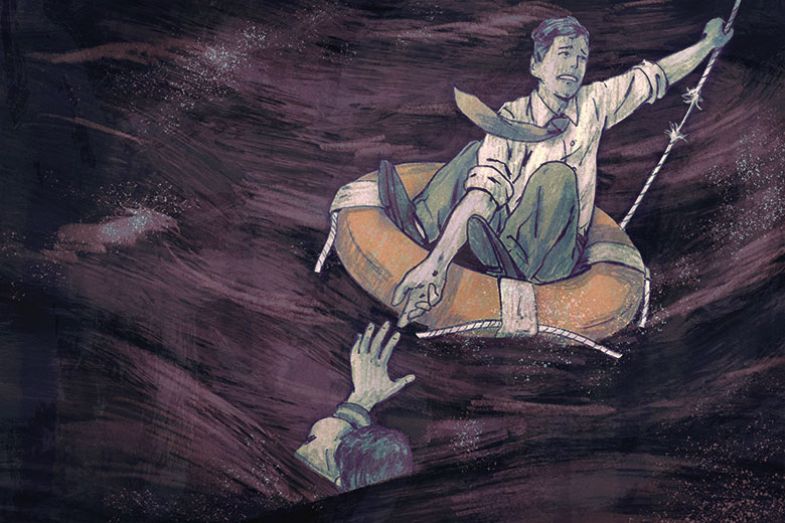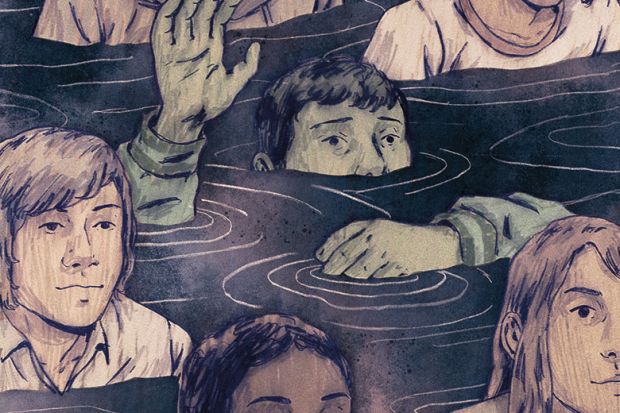“I couldn’t risk losing another one,” says an academic we’ll call Anna, in a university courtyard on a late summer’s day. The campus is bristling with anticipation for the new academic year.
Anna is wearing a floral shirt and radiates warmth and affability. She is talking about a student who was in such a state that she decided to walk him to A&E: “What if he got lost? I mean, I would feel responsible till the end of my days.”
She also recalls another student who emailed her about suicidal thoughts on a Saturday night: “I think I spent a couple of hours on the phone with this student and her friend who was also there. I made sure that the friend would get her to A&E.”
A few years ago, Anna did lose a student to suicide. The death made her and her colleagues a lot more anxious: “The possibility of something really bad happening is very much at the forefront of our thoughts. It really weighs on you.”
More and more students are looking to academics for support with serious mental health issues. It is only natural that academics such as Anna want to do all that they can to support such students. Nevertheless, they often experience the kind of helplessness described by “Sam”, a social scientist at a university in the Midlands, when he talks about a student he recently lost to suicide.
“Even when you are helping someone,” he explains, “you’re wondering: is there something more I can do?”
What overwhelms him most, Sam goes on, is the “sheer number of students that need additional support”, noting that even “just sitting down and talking to people who’ve had a really rough time – it takes a toll”.
Students often don’t realise the lengths some academics will go to to look out for them. Niamh, for example, lost her brother (also a student) to suicide while she was in her final year of university. But she was determined she would finish the academic year and signed up to student mental health services.
On one occasion, a few weeks after her brother’s death, she was in tears talking to her mother on the phone. A few hours later, she bumped into her personal tutor outside a coffee shop. Niamh would only discover a year later that the meeting wasn’t a happy accident. Her mother had emailed the tutor about her worries. And the tutor had then spent an hour scrambling around campus looking for her.
Studies generally show that student mental health is getting worse. A report published by the Institute of Public Policy in 2017 found that, in the previous five years, most higher education institutions saw at least a 25 per cent increase in the numbers of students requesting counselling. Those disclosing a mental health condition to their university, according to the Higher Education Statistics Agency, doubled from 33,045 to 66,660 (between 2014 and 2017).
Universities UK also found a steady increase in the number of student suicides in the past decade, with 95 between July 2016 and July 2017 (the latest available statistics). Yet, significantly, two-thirds of students who die by suicide are not known to university mental health services. In such cases, the most senior adults they are in contact with are likely to be those who teach them.
On one level, this makes sense. Academics are the personal tutors, course organisers and lecturers who see their students on a regular basis and whom students are encouraged to make their first port of call at times of distress. Yet academics are not counsellors, and most have had no training in how to support such students. Many are themselves struggling with the pressure to publish, the lack of long-term contracts and failed grant proposals.
So is it fair to expect academics to shoulder this burden and are universities doing enough to support them? In Anna’s case, very little help was forthcoming.
After her student’s death, she emailed senior management several times about offering counselling sessions to those in the student’s year group. It was a relatively small cohort. The university responded by asking who in the class needed it most.
“How would I know?” Anna replied.
Group counselling sessions were offered instead, although again only at her request.
Meanwhile, Anna and her colleagues went back to work as usual. Nobody at the university asked if they were OK or offered them counselling sessions.
Since the personal tutors in her department are not trained in pastoral care or how best to look after themselves, Anna tried to organise a workshop with student mental health services. But she found they were unwilling to help, saying they didn’t have the time or personnel to spare.
Other factors exacerbate the tendency for academics to take on much of the burden of trying to aid students with mental health problems.
One is the lack of clarity about what their “pastoral” responsibilities entail. Most people would agree these include helping a student with a piece of reading or an essay, but should that extend to a student’s personal problems? In practice, it is virtually impossible to make such a clear-cut distinction, given that academic and personal problems very often overlap.
University guidelines often suggest that academics should restrict their interventions to “signposting”: telling students what their options are and explaining how to get help. Academics are not meant to provide this help themselves.
Yet the simple word “signposting” disguises how complicated such a task can be. As Anna points out, “You have to decide, ‘Is this a small thing where a couple of tissues is enough or is it serious?’ – which none of us are equipped to do.”
Hannah Murray, a teaching fellow in early American studies at the University of Liverpool, adds that signposting works only if the rest of the system is working: “Counselling services both within and outside the university have incredibly long waiting lists and students still need someone to listen to them and help navigate issues around attendance.”
Furthermore, Murray highlights the fact that the responsibility for supporting students in distress tends to fall largely on female academics. Several studies show that students are more likely to see women as caring and nurturing, and so to go to them with their problems. This adds an extra gender dimension to the general issue of academics having to step up when students suffer from anxiety or depression.

Taking all this together, we clearly have a grim situation. More students suffer from mental health problems, and yet it is often untrained and unsupported academics (particularly women), rather than professionals, who end up on the front line providing support. Neither students nor academics are best served by this system. So what needs to change?
Gareth Hughes, research lead for student well-being at the University of Derby, is one of the few academics to have studied the effects of the student mental health crisis on academics. He believes that there needs to be better communication between academics and student mental health services, noting that his university has established a phone line specifically for academics to call about students they are worried about.
Although students are becoming more open about mental health, Hughes adds, academics have not kept pace. No senior university leader, he claims, has openly discussed struggling with mental health. For academics and students alike, “universities should be a place where it’s OK to admit this stuff”.
Helen Carr, the University and College Union’s national head of equality and participation, agrees that there is a “taboo in a lot of places about [academics] disclosing issues around mental health because employers might think their mental health issues [could] affect students”. Managers need to be given the tools to talk to academics about mental health, and a culture change is required in academia too, so academics feel comfortable talking about it among themselves.
Murray would like the responsibility of supporting students shared more equally between men and women. Although she acknowledges that it may be difficult to overcome broader societal expectations, one solution would be for all first-year students to have personal tutors who also teach them. That way, the student would be more comfortable speaking to them outside the classroom, man or woman.
Perhaps the most comprehensive set of suggestions comes from “Bob”, a chemist at a university in the north of England.
In his own role as a personal tutor, Bob gets two or three students a week coming to him with personal problems. He has had 10 students talk to him about suicidal thoughts in the past three years. He even had meetings at 9am every day for a month with one student he was worried about, just so he knew that “he was safe”.
Despite the burden of all this, Bob reports on several support systems that his university has put in place – and that others could also consider. In his own department, every new personal tutor is given an academic mentor who can advise them on how to deal with difficult situations. Moreover, all tutors must take a two-day “mental first aid course”. The department designates “year tutors” who receive a higher level of mental health training and who can provide additional support to individual personal tutors.
There is also another level of support. Notwithstanding the challenges of dealing with students who come to him in distress, Bob stresses that it is the students who do not talk to academics about their issues who worry him even more. By the sixth week of the new year, therefore, he has created an electronic watchlist of students he is concerned about.
“We look at engagement,” he explains. “We look at marks. We see if students did not attend.” Bob’s students have no idea about the level of resources the university is putting in to keep an eye out for them.
All these solutions reflect the difficulties in being an academic today. In 2017, Universities UK created a framework for university mental health called StepChange. One of its suggestions was to “enhance the role of the personal tutor”, although (like other suggested solutions) this in effect implied that the key to helping overwhelmed academics is to put even more responsibility on their plates.
It is fairly uncontentious that students should feel comfortable talking to academics about their mental health, and that academics should be better trained in supporting their students. But is this enough? Anna’s solution is the most straightforward. She wants her department to have a psychotherapist on call, someone whose sole job is to support students, “even just for three hours a day”.
Although Universities UK claims that mental health is “of course” a priority for universities, Anna’s comment – “You don’t have to build another wonderful expensive building – just get a couple more people in” – makes it clear that many academics are sceptical.
According to a BBC investigation published in 2018, UCL was one of the universities that spent the most on mental health in the 2016 academic year: just over £1.3 million. Yet what was the price tag for the redevelopment scheme for its law building in the same year? £16.5 million.
Perhaps saying mental health is a priority is no longer enough. Ultimately, as many hard-pressed academics will tell you, it’s money that talks.
Jason Murugesu is a postgraduate student at Imperial College London studying science communication.
POSTSCRIPT:
Print headline: Stemming the tide of misery
Register to continue
Why register?
- Registration is free and only takes a moment
- Once registered, you can read 3 articles a month
- Sign up for our newsletter
Subscribe
Or subscribe for unlimited access to:
- Unlimited access to news, views, insights & reviews
- Digital editions
- Digital access to THE’s university and college rankings analysis
Already registered or a current subscriber? Login








